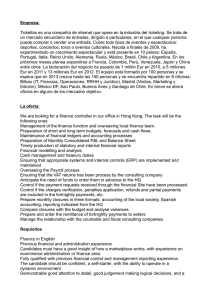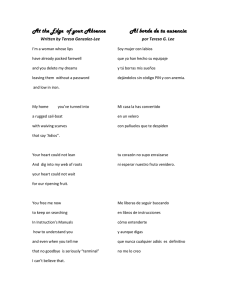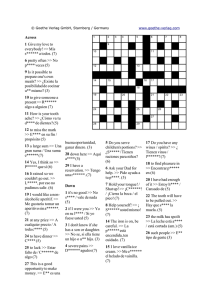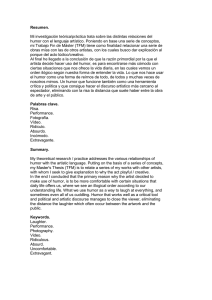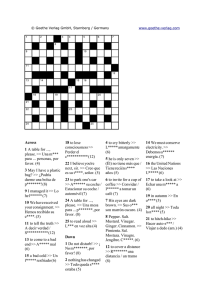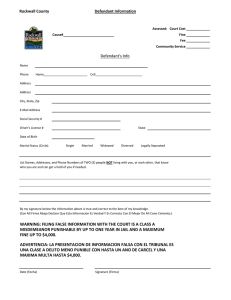LESSON 2 Phrases with go and other holiday activities (página 152
Anuncio
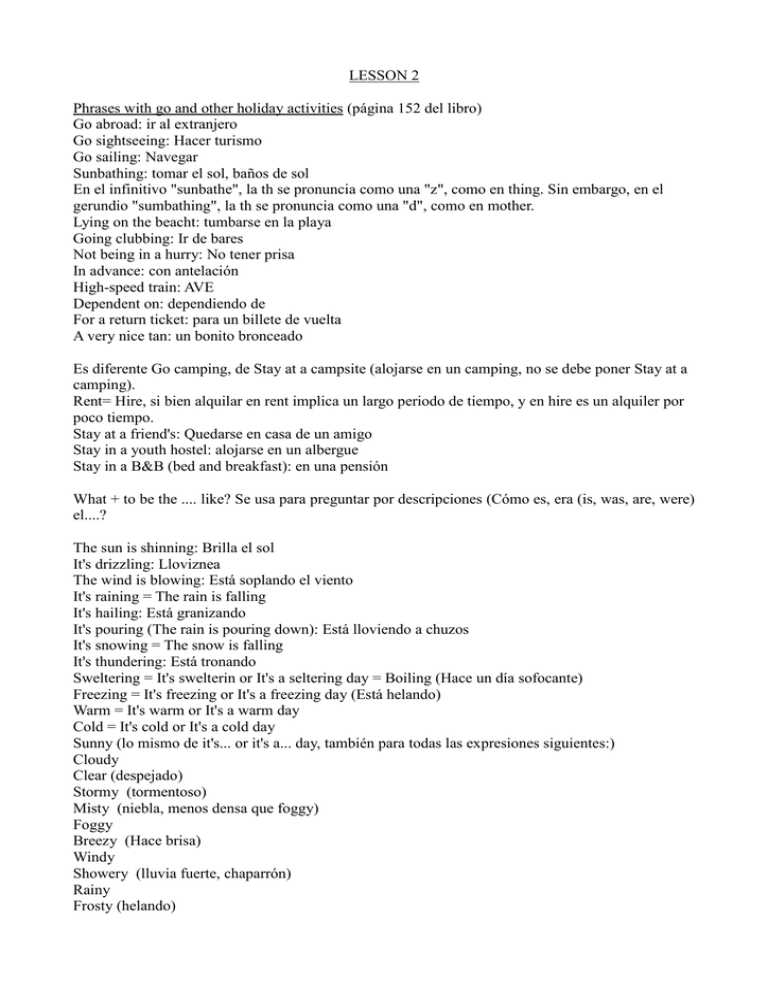
LESSON 2 Phrases with go and other holiday activities (página 152 del libro) Go abroad: ir al extranjero Go sightseeing: Hacer turismo Go sailing: Navegar Sunbathing: tomar el sol, baños de sol En el infinitivo "sunbathe", la th se pronuncia como una "z", como en thing. Sin embargo, en el gerundio "sumbathing", la th se pronuncia como una "d", como en mother. Lying on the beacht: tumbarse en la playa Going clubbing: Ir de bares Not being in a hurry: No tener prisa In advance: con antelación High-speed train: AVE Dependent on: dependiendo de For a return ticket: para un billete de vuelta A very nice tan: un bonito bronceado Es diferente Go camping, de Stay at a campsite (alojarse en un camping, no se debe poner Stay at a camping). Rent= Hire, si bien alquilar en rent implica un largo periodo de tiempo, y en hire es un alquiler por poco tiempo. Stay at a friend's: Quedarse en casa de un amigo Stay in a youth hostel: alojarse en un albergue Stay in a B&B (bed and breakfast): en una pensión What + to be the .... like? Se usa para preguntar por descripciones (Cómo es, era (is, was, are, were) el....? The sun is shinning: Brilla el sol It's drizzling: Lloviznea The wind is blowing: Está soplando el viento It's raining = The rain is falling It's hailing: Está granizando It's pouring (The rain is pouring down): Está lloviendo a chuzos It's snowing = The snow is falling It's thundering: Está tronando Sweltering = It's swelterin or It's a seltering day = Boiling (Hace un día sofocante) Freezing = It's freezing or It's a freezing day (Está helando) Warm = It's warm or It's a warm day Cold = It's cold or It's a cold day Sunny (lo mismo de it's... or it's a... day, también para todas las expresiones siguientes:) Cloudy Clear (despejado) Stormy (tormentoso) Misty (niebla, menos densa que foggy) Foggy Breezy (Hace brisa) Windy Showery (lluvia fuerte, chaparrón) Rainy Frosty (helando) Snowy Icy (hiela Drizzly (caen 4 gotas) Dry (seco) Wet (húmedo) Describing places: Ancient= a place with a long history Beautiful / attractive / lovely / fascinating / charming (encantador) = pleasant to the eye or a very nice place Exciting = fun o thrilling with lots of enjoyable things to do (enjoyable: cosas divertidas) Crowded: full of people Cosmopolitan = a varied mix of cultures and languages Lively = lots of things are going on (con vida, animada) Polluted = dirty, contamined Touristy = visited by lots of tourists Luxurious hotel: hotel de lujo Basic hotel: hotel con lo justo Helpful people: gente solícita, servicial Revolting food: comida que hace vomitar Composition I went to Asturias last summer with two friends. We travelled by car. We had a good journey. Then we stopped in some picturesque villages along the way: Castrourdiales, Santillana del Mar and Llanes. We stayed for a week in a small hotel near the sea in Gijón. The hotel was basic but it was quite cheap and comfortable. During the day we walked around the city. We saw all the famous places like the Marina, the S. Pedro Church, Revillagigedo Palace, etc. At nigth we went to restaurants in the Cimadevilla. Gijón is a charning city and its people are very friendly. We also approached other towns and villages in Asturias: Oviedo (a monumetal quiet town), Avilés (with a wonderful historical quarter), Cudillero (a fairy-tale village) and Luarca (where we were served a delicious meal). We had a great time, even the weather helped a lot! Vocabulary Somethig was wrong: Algo estaba mal A cheery mood: De buen humor No longer smiling: Ya no está sonriendo It didn't really matter: No importaba His heart sank: Se vino abajo (Su corazón se hundió, literalmente) To sink: hundir, hundirse Biting his nails: mordiéndose las uñas Being untidy: siendo desordenado Rather untidy: bastante desordenado Rather: bastante (con característica negativa. Es igual a quite, pero se acompaña de adjetivos negativos) Clearing up: recogiendo I can't stop doing it: No puedo dejar de hacerlo Neither of us: a ninguno de nosotros End up traving problems: acaban teniendo problemas Be good at: ser bueno en algo Be bad at: ser malo en algo She has to make a big effort: Ella tiene que hacer un gran esfuerzo A complete mess: un completo desastre Should try to change: debería intentar cambiar Should: debería Hadns-free: manos libres You might have an accident: Puede que tengas un accidente You might cause somebody to have an accident: Puedes causar un accidente a alguien It isn't compulsory: No es obligatorio Stop + gerundio: Evitar algo Elderly: mayor (viejo) Older: más viejo (cuando es de objetos) = Elder: más viejo cuando es de persona The outskirts: las afueras Sleeping bag: saco de dormir At my air pace: a mi manera Package holiday: paquete de vacaciones Colleage = workmate: compañero Getting drink: emborracharse Lose passport / luggage /wallet You are stollen: te roban Fake: falso Get ill: enfermarse = Fall ill Traffic jam: atasco de tráfico Miss a flight / train Past simple: página 128 del libro We use the past simple for finished actions in the past.. Spelling rules (reglas ortográficas) Affirmative: Subject + infinitiv-ed (regular) + objects Infinitive+ed * Para verbos acabados en e+d. Ej: lived * Si acaba en y: vocal+y: played (normal) consonant+y: study-studied (i latina en lugar de y) * Monosílabos acabados en consonante, la doblan: stopped Negative: Subject + didn't + infinitve + objects I didn't play tennis I didn't eat spaghetti yesterday Interrogative: Did + subject + infinitve + objects? Did you play tennis? Did you eat spaghetti yesterday? Short answer: Yes, I did No, I didn't Pronunciación pasados 1.- El pasado de los verbos que acaban con los sonidos /f/, /k/, /p/, /s/, /ʃ / ó /tʃ/, se pronuncia /t/: Press: presionar – pressed /prest/ Worked /wɜːkt/ /f/- laugh /lɑːf/ - laughed /lɑːft/ /k/ - look, like /p/ - hope (tener esperanza, creer), stop /s/ - pass (pasar, aprobar) /ʃ / - wash, finish, push (empujar) /tʃ/ - watch 2.- El pasado de los verbos que acaban con el sonido /d/ y /t/ se pronuncian /ɪd/ Pat (acariciar) – patted /'patɪd/ Visited /'vɪzɪtɪd/ Wanted Needed 3.- Todos los demás verbos se pronuncian /d/, también los sonidos vocálicos Joined /'dʒɔɪnd/ Lived /'lɪvd/ Cleaned /'klɪnd/ Pronunción final como /t/ worked finished looked liked watched stopped passed pushed laughed washed walked cooked booked missed Pronunciación final como /d/ lived died cleaned loved stayed moved retired climbed called served joined studied listened played danced ussed Pronunciación final como /ɪd/ started visited loaded wanted promoted attended appointed hated needed shouted Past continuous: página 128 del libro Was/were + verb+ing * Use the past continuous to describe an action in progress at a specific moment in the past. * We often use the past continuous to describe the situation at the beginning of a story or narrative. He was playing tennis when it started raining She was driving when her mobile rang/ when somebody called her They were having a noise party when the police arrived/came He was having a shower when somebody knocked on the door He was sleeping when the baby cried She was walking her dog when she met a friend A pain in the ass: coñazo (con dolor en el culo, literalmente) Think twice: pensárselo 2 veces A fortnight: una quincena To snore: roncar To hook: coquetear Split up: romper (una pareja) To fight: discutir (con violencia), luchar To discuss: discutir (de intercambiar opiniones) Prepositions at/in/on (página 153 del libro On se utiliza en transportes, cuando éstos son públicos (on a bus, on a train, on a plane). Cuando son privados, se usa la preposición at: at a taxi, at a cab At the weekend = at weekends (English) = on weekends (American) on 4th November = on (the) 4th (of) November Vocabulary Climbing up a ladder: subiendo la escalera (escalera portátil) A shark is about to attack: Un tiburón está a punto de atacar Loch: lago en escocés = lake I was getting bored: Me estaba aburriendo Make the beds: Hacer las camas Make diner / Make lunch At Ana's: en casa de Ana (se omite home) At my friend's: en casa de mis amigos At home: en mi casa. In a demostration: en una manifestación A display: una demostración Picked me up: me levantó / me alzó On the coner of magazines = on the front of magazines: en la portada de las revistas Not a penny!: Ni un duro Inherit: heredar Composition This photo has taken twenty-five years ago. We were in a big stone house in Perarrua, next to river Esera, near Graus. The girl in the middle is my friend Natalia, one her right it is her sister Noelia and one her left it is me. We were celebrating a pyjamas party in their grandfathers' when we decided to take a photo with an automatic camera. I haven't heard from Natalia for a long time until she called me three weeks ago. We met our partners for dinner in my house last week, and during the evening we seeing some old photos like this one. We had a good time remembering our youth and we told about our present lives. I therefore love this photo because it represents my past and my reunions with my friend Natalia. Time sequencers (página 128 del libro) Afther that + sentence = then + sentence After + noun (no una frase) Although: aunque /ɔːl'ðəʊ/ Next / last (nunca se dice the next, the last, siempre van sin artículo) Suddenly = All of a sudden Antes de but, so y althoug, suele ir una coma “,” I'm tired, but ... Vocabulary Madly in love: locamente enmorado/a Brake: frenar (verbo), freno (sustantivo) As he was wearing a dark cota, Hannah didn't see him = He was wearing a dark coat, so Hannah didn't see him I was so tired that I went to bed: aquí “so” no es un conector, sino que se traduce por tan (Estaba tan cansada que me fui a la cama) Just in time: a tiempo She ended up in jail: Ella acabó en la cárcel Injured: herido Dead: muerto A bad injury: mal herido In intensive care: en cuidados intensivos Number plate: número de matrícula Drive away: escaparse

